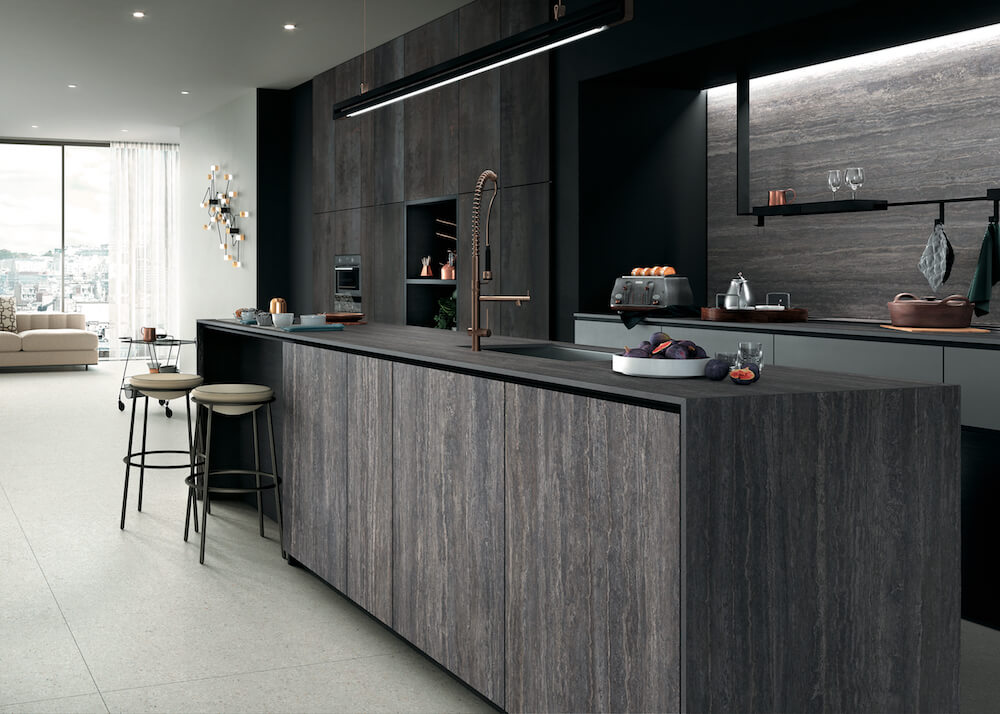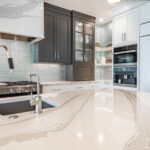Porcelain vs Quartz Countertops
When it comes to choosing a countertop material for your kitchen or bathroom, the range of options can be overwhelming. Two popular options are porcelain and quartz countertops. While they may look similar, there are several key differences you should consider before making your choice.
Porcelain Countertop Colors
Porcelain countertops are a great option for those who want to add a touch of elegance to their kitchen or bathroom. Not only are they durable and easy to maintain, but they also come in a wide range of colors to suit any taste.
One of the biggest advantages of porcelain countertops is their consistency in color. Unlike natural stone, which can have unpredictable color patterns, porcelain offers a more uniform look. This makes it easier to match with other elements in your kitchen or bathroom, such as cabinets, backsplash, and flooring.
When it comes to color options, porcelain countertops offer a vast range of choices. From bright whites to deep blues, there is a shade to suit any style. If you prefer a more natural look, porcelain can also be made to imitate the look of natural stone, such as marble or granite. This can provide a more affordable alternative for those who love the look of high-end stone but don’t want to pay the price.
Another benefit of porcelain countertops is their resistance to fading. Unlike some natural stone options, which can fade over time due to exposure to sunlight, porcelain maintains its color and shine for years to come. This means that your countertops will look just as beautiful as the day they were installed, even after years of use.
Porcelain countertops are also resistant to scratches and stains, making them a great option for busy households. They are easy to clean with a damp cloth and mild soap, and they don’t require any special sealers or treatments to maintain their beauty.
Overall, porcelain countertops offer a great combination of beauty, durability, and easy maintenance. With their wide range of color options, you can create a stunning look in your kitchen or bathroom that will last for years to come.
When it comes to choosing the right material for your kitchen or bathroom countertops, cost is an important factor to consider. Porcelain and quartz are two popular options, each with their own advantages and disadvantages.
Porcelain is a type of ceramic material that is made from a mixture of clay and feldspar. This makes it relatively easy and inexpensive to manufacture. Porcelain is also available in a wide range of colors and patterns, which makes it a popular choice for homeowners who want a customized look for their countertops.
However, it’s important to note that porcelain is more prone to chips and cracks than quartz. This can be especially problematic in high-traffic areas like the kitchen, where countertops are more likely to be bumped or hit with heavy objects. If your porcelain countertop does get chipped or cracked, it will need to be repaired or replaced, which can be costly.

Cost Comparison for Porcelain vs Quartz Countertops
Quartz, on the other hand, is made of a combination of crushed quartz and resin. This makes it more expensive to manufacture than porcelain. However, quartz is highly durable and resists scratches and chips, which means you’re less likely to have to invest in repairs or replacements down the line. This makes quartz a better long-term investment, especially if you plan to stay in your home for many years.
In addition to being durable, quartz is also available in a wide range of colors and patterns. Some manufacturers even offer quartz countertops that mimic the look of natural stone, such as granite or marble. This makes it a popular choice for homeowners who want the look of natural stone without the maintenance requirements.
Ultimately, the choice between porcelain and quartz comes down to your personal preferences and budget. If you’re looking for a cost-effective option that offers a wide range of colors and patterns, porcelain may be the right choice for you. However, if you’re willing to invest a bit more upfront for a highly durable and low-maintenance option, quartz may be the better choice in the long run. Learn more about quartz countertops cost.
Pros and Cons of Quartz Countertops
Quartz countertops have become increasingly popular in recent years due to their durability and low maintenance. But what are the other pros and cons of this material?
Aside from its durability, quartz boasts a few other benefits over porcelain. One key advantage is that quartz requires very little maintenance. Unlike natural stone, which needs to be sealed regularly to prevent stains, quartz is non-porous and stain-resistant. This makes it a popular choice for kitchens and bathrooms that see frequent use.
In addition to its low maintenance requirements, quartz is also available in a wide range of colors and patterns, making it easy to find a style that fits your home decor. It’s also highly resistant to scratches and chips, which is great for families with young children or pets.
On the downside, quartz does have a few drawbacks. It can be more susceptible to heat damage than porcelain, meaning you’ll need to be careful when placing hot pots and pans on the surface. However, many manufacturers now offer heat-resistant quartz options that can withstand high temperatures without damage.
Additionally, quartz can be heavier than other countertop materials, which can make it more difficult to install. This can add to the overall cost of the project, as you may need to hire professionals to properly install the countertops.
Another potential drawback of quartz is that it can be more expensive than other countertop materials, such as laminate or tile. However, many homeowners find that the durability and low maintenance requirements of quartz make it a worthwhile investment in the long run.
In conclusion, quartz countertops offer a variety of benefits, including durability, low maintenance, and a wide range of styles to choose from. However, it’s important to consider the potential drawbacks, such as heat susceptibility and higher installation costs, before making a decision.
While porcelain and quartz countertops are both popular options for homeowners, it’s important to understand the differences in their durability.
Porcelain is a type of ceramic material that is made by heating clay and other materials at high temperatures. This process creates a hard, durable surface that is resistant to scratches and stains. This makes it a great option for busy homes where spills and messes are common.
However, it’s important to note that porcelain can be more prone to chipping and cracking than other materials. This is because it is a brittle material that can be more easily damaged by impact. Additionally, porcelain can be more porous than other materials, meaning it may need to be sealed more frequently to prevent stains from setting in.
Quartz, on the other hand, is a man-made material that is composed of natural quartz crystals and resin. This combination creates a surface that is highly durable and resistant to chips and scratches. Quartz is also non-porous, meaning it is less likely to stain than other materials.
One advantage of quartz is that it can be made in a wide range of colors and patterns, making it a versatile option for any kitchen or bathroom. Additionally, because it is a man-made material, it can be customized to fit any size or shape of countertop.
When it comes down to it, both porcelain and quartz have their strengths and weaknesses when it comes to durability. Ultimately, the best option for your home will depend on your specific needs and preferences.
Porcelain Countertops vs Quartz Conclusion
When it comes down to it, deciding between porcelain and quartz countertops ultimately comes down to personal preferences. If you’re looking for an affordable, versatile option with a wide range of color choices, porcelain may be the way to go. However, if you’re willing to invest a bit more upfront for a long-term investment, quartz is highly durable and requires minimal maintenance. Whatever your choice, make sure to work with a reputable installer who can ensure your new countertops look great and stand the test of time.



